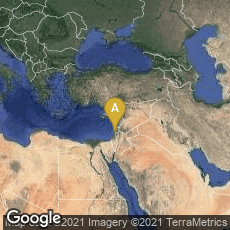

A: Caesarea, Haifa District, Israel
So few codices and papyrus rolls have survived from the third and fourth centuries—the period of transition from the roll to the codex— that we know remarkably little about the specific contents of any public and private libraries from the time. One exception is the library of the bishop and historian Eusebius of Caesarea (Eusebius Pamphili). No catalogue of his library survived, but since Eusebius referenced so many specific sources in his voluminous writings, it was possible to work backwards from those references to reconstruct at least part of the library that Eusebius used from around 280 to 339. This was done by Andrew James Carriker in The Library of Eusebius of Caesarea (2003).
"Despite Jerome's reference to this library as the bibliotheca Origenis et Pamphili, the two men who endowed it with its greatest bibliographic wealth, the modern investigation of the library at Caesarea must focus on the library in the possession of Eusebius, Pamphilus' pupil, for Eusebius furnishes the most evidence of its contents in his voluminuous extant writings. Four of these works contain the most important evidence and have according been given the most attention: the Chronicon for historical works; the Historia Ecclesiastica (HE) for Jewish and Christian works; the Praeparatio Evangelica (PE) for Jewish and Christian works; and the Vita Constantini (VC) for contemporary documents. The primary work of this book is thus to reconstruct the contents of the library from the quotations and references in these four works. Some of the difficulties of this task, most notably the problem of establishing whether Eusebius used his sources firsthand or through intermediaries, are treated in chapter two." (Carriker, xiii-xiv).
Perhaps because Eusebius's writings remained central to the early history of Christianity, his writings remained in circulation through the Middle Ages up to the present, and have generated many editions and commentaries, beginning soon after Eusebius's death. Working through the primary sources and the main commentaries, Carriker was able to produce on pp. 299-311 of his very extensively footnoted study, a list of 288 or more specific works that Eusebius owned or used in the fields of Philosophy, Poetry, Oratory, History, Jewish Literature, and Christianity. Carriker believed that the actual number of books in Eusebius's library would have been larger, perhaps 400.